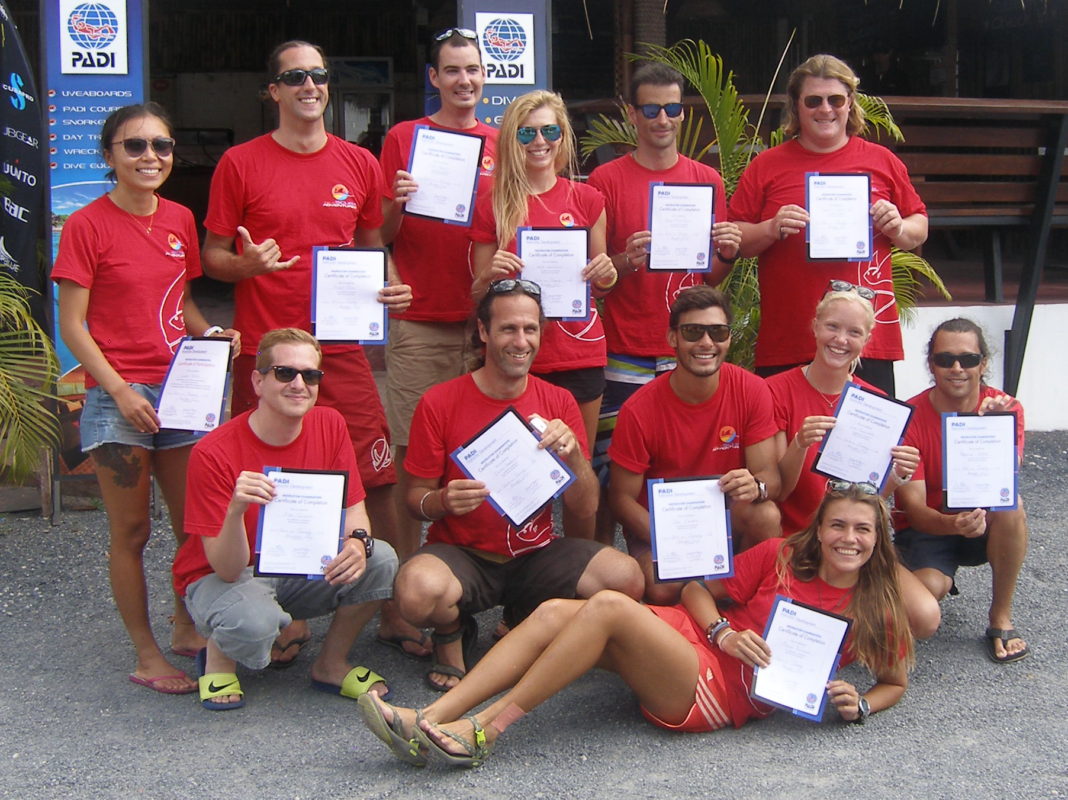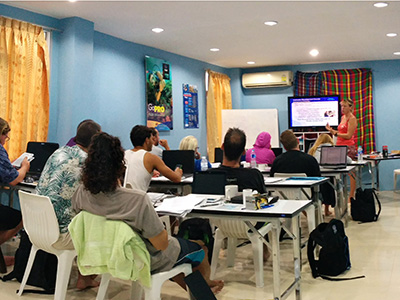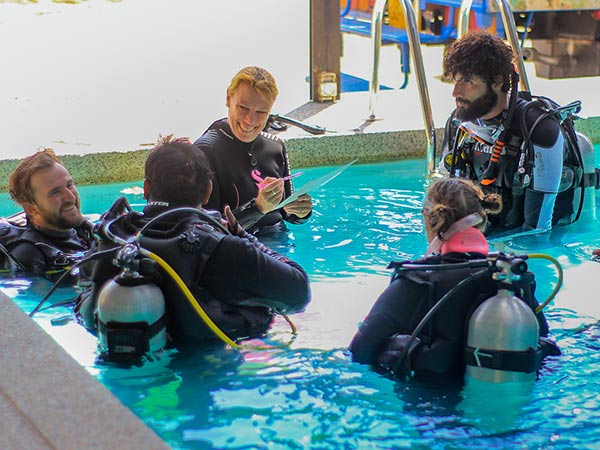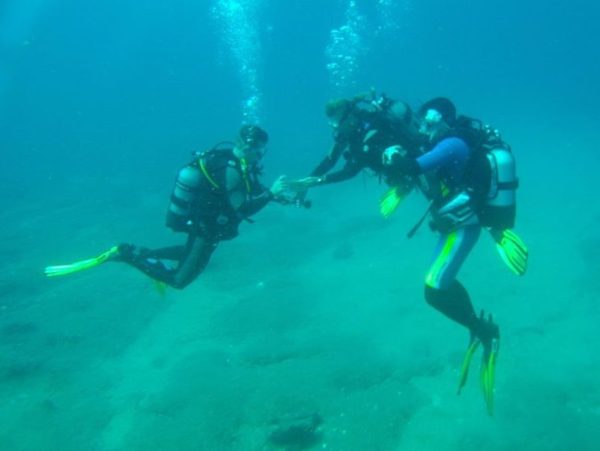The PADI Instructor Development Course (IDC)
The Instructor Development Course (IDC) can be a lot of fun or a lot of stress, and most of the time the difference comes down to preparation.
It requires a commitment of time, money and effort, but if you make sure that you are physically and mentally ready for this next step, you will enjoy the course and everything you learn on it.

An IDC takes just 2 weeks to complete, and is followed by an Instructor Exam. Once passed you become a PADI Open Water Scuba Instructor. Here we’ll take a look at the PADI Instructor Development Course, the Instructor Exam, and how to make the whole experience easier.
So what is the IDC?
The IDC is broken down into 5 parts:
- A series of Presentations by a Course Director or Staff Instructor
- Learning how to deliver Knowledge Development (classroom) presentations
- Exams on Dive Theory and PADI Standards
- Learning how to teach in Confined Water
- Learning how to teach in Open Water
The IDC Presentations
The presentations by the Course Director cover some underpinning basics as well as a full review of the core courses that an instructor will be able to teach.
Included in these reviews are a series of exercises that get the Instructor Candidates familiar with the Instructor manual, the standards related to each course, and how to find information. We look at risk awareness and responsibility, how the courses link to each other and the Instructors role in keeping their students safe.
Learning how to teach
The main difference between a Divemaster and an Open Water Scuba Instructor (OWSI) is that an OWSI can teach students who have never learned the skills before, whereas a Divemaster can only review previously-learned skills.
As a result, the main emphasis of the IDC is learning how to teach. Positive reinforcement is a key part of the PADI way of teaching. Nobody wants to fail, but part of any learning process is making mistakes, learning from those mistakes and getting it right the next time.
The IDC develops a candidates ability to spot and correct problems, reinforce the correct technique and maintain a positive attitude throughout. We do this in the classroom, the pool and the open water in each of the teaching segments.
In-Water Training
As part of the water sessions you will be asked to show your ability to demonstrate all the core skills required for the Open Water Course, as well as demonstrating how to rescue an unconscious diver on the surface.
We as Course Directors spend time at the beginning of the course reviewing your Divemaster skills. However, the key word here is ‘reviewing’ not teaching.
The Exams
Your Course Director will have many ways of making the learning easier – tips, tricks, simple ways to remember things. We’ll give you feedback on how you are doing and will make time for you if you need extra help.

Presentations
from your Course Director

Teaching in Confined
We’ll give you feedback

Open Water Training
Learn to teach in Open Water
The Divemaster Course – the most important pre-requisite
One of the main things that will make your IDC harder is lack of preparation. If your DM skills are not fresh or weren’t learned thoroughly in the first place, then you’ll be playing catch-up throughout your IDC. It doesn’t mean that you won’t get through, but it leads to long evenings revising, unnecessarily difficult exams, and higher stress levels generally as you try to bring yourself up to the required standard.
If you haven’t yet done your Divemaster Course, do your research and try to find a thorough one. You should look for a minimum of 4 weeks of learning and diving (not 4 weeks of lugging tanks with very little learning!)
The secret to an easy IDC is a good Divemaster Course. In a Divemaster Course you go from enthusiastic amateur diver to Dive Professional. The course can be done in just 2 weeks, but the good ones take about 6 weeks.
The transition to Dive Professional means that you:
- hone your dive skills to demonstration standard
- learn the art of leading dives (including good, informative briefings)
- follow both beginner and continuing education courses
- bring your knowledge of dive theory up to professional levels
- demonstrate that both your physical fitness and attitude are up to scratch
Once you’ve completed your divemaster course you can go straight on to your IDC (make sure that you have a minimum of 100 dives!) If you have the time and opportunity, a season working as a divemaster can make a big difference to your confidence – both on the IDC and as an Instructor.
IDC Final Assessment
To pass the IDC you need to achieve the required grades on the 4 areas of assessment.
- Exams
- Classroom presentations
- Confined Water Presentations
- Open Water Presentations
There are specific requirements for each element, but to simplify it, a passing grade is approx 75% in each element. You need to achieve the required grade in all sections to pass the IDC.
Once you pass the IDC you can go forward to the Instructor Exam (IE). At this point the job of the Course Director is done. They are usually around to give logistical and moral support, but the IE itself is conducted by an independent PADI examiner.
Many people get stressed or nervous about the IE- I speak from personal experience here!But if you stop and take a moment, you will realise that the Course Director has already said that you are good enough to be an OWSI.By assessing you, the PADI Examiner is simply checking the Course Director’s work.
The Instructor Exam (IE)
The IE covers the same 4 elements as the IDC – think of it as a 4 piece jigsaw. You need to pass each segment to pick up that jigsaw piece, and when you have all 4 pieces you can call yourself a PADI Instructor.

What if I fail a section?
If for some reason you ‘have a brain fart’, or ‘everything turns to custard’ and you fail to pass one segment, keep going!
However devastated you may feel at that moment, carry on and complete the remaining parts. You’ll have to come back to another IE, but you only have to take the segment(s) that you failed. Get the others out of the way so that you can focus on the one area that you had difficulty with.
Is there anything I can do to make the IDC easier?
Yes there is!
- If you’ve done your Divemaster Course and have the opportunity to work for a while as a Divemaster – do it. Your confidence will increase, you’ll refresh many of your core skills, and your interaction with students and divers will make classroom presentations much less daunting.
- If it’s been a while since you did your DM course, consider taking a refresher. We offer a 3-day refresher course covering all the dive theory, skills circuits and rescue exercises to get you up to speed.
As a minimum:
- Review your divemaster theory, particularly physics and RDP, and make sure you are comfortable using the eRDPML
- If you haven’t dived for a while, get your gear out and go for a few dives to get comfortable again
- Practice your skills circuit
- Most of all – Have Fun! You’re on the road to living your dream, don’t lose sight of that!

